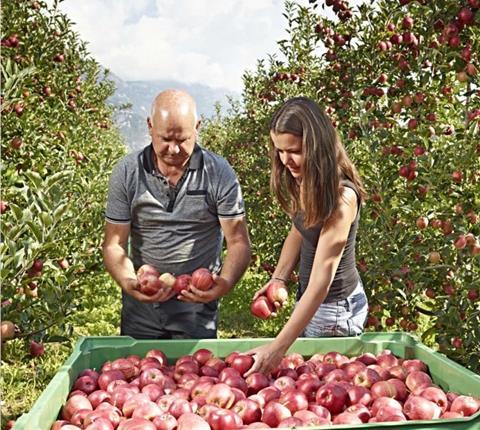
Italy’s major apple marketers have all struck a reasonably positive note as the country’s apple harvest gets into full swing in the coming few days, despite the obvious challenges presented by an on-going crisis of consumption, a forecast large crop, the Russian import ban and, as reported by Italiafruit News, less than satisfactory opening prices for the early variety Gala.
Gerhard Dichgans, managing director of the South Tyrol’s largest producer group Vog, said his company “already had numerous requests for the first Gala” largely as a result of overseas supplies being “practically exhausted”.
“It seems therefore that there won’t be any problem switching from imported apples to fresh European production,” he said.
In fact, while accepting that Russia’s decision to ban all European Union fruit might upset the European market’s fragile balance, it could also potentially make the EU a better place to sell apples, Dichgans suggested.
“Russia will have to make sure it replaces the missing imports from Poland and Europe with products from other regions. This could bring China into play and, from next spring, purchases from countries in the Southern Hemisphere.
“The unknowns are not lacking; what’s clear is that, in future, overseas product will have an increasingly marginal role in our continent’s market.”
Luca Granata, managing director of leading Italian apple marketer Melinda, agreed that Russia’s need to substitute European apples with fruit from other sources would most likely see the market resettle albeit with a different constitution.
“[Russia] is the world’s largest apple importer, buying one million tonnes of apples every year: I believe during the season about to start this figure won’t change much and so in the end the enormous Russia apple imports will serve to maintain equilibrium in the global apple deal, even if the embargo against the EU-28 lasts a long time.”
Demand curve
Josef Wielander, director of co-operatives association Vip, said the Val Venosta region of South Tyrol was expecting an excellent harvest that, like Vog’s, would be around 10 days earlier than last year.
“Initially we expect supply to be higher than demand and so prices will be moderate,” he admitted, but added: “If the consumer can count on an excellent product at an accessible price, then it could be that around the end of January we will reach a balance between supply and demand, with a return to normality.”
But he also conceded that the Russian ban would have a notable impact on the apple trade.
“The Russian question definitely reshuffles the pack,” he said. “The lack of exports inevitably creates problems and will see volumes of our produce otherwise destined for Moscow rebound on to our markets.
“So even if we have nothing to fear in terms of quality, the fact of having to compete with countries that have lower labour costs will create a confusing situation for buyers.”
Early birds
It’s been a particularly early start to the season for producers selling their fruit through the co-operative organisation La Trentina, which began offering Italian apples to buyers in early August – around five or six days earlier than the five-year average.
With prices down but quality high, the group’s commercial director Simone Pilati feels there is much to be gained.
“From the beginning of August we have been present in our commercial channels, where we recorded a lot of interest and momentum,” he reveals. “We started with lower prices last year but twelve months ago they started high and then there was a decline. Now, the excellent quality and lower prices could boost consumption.”



